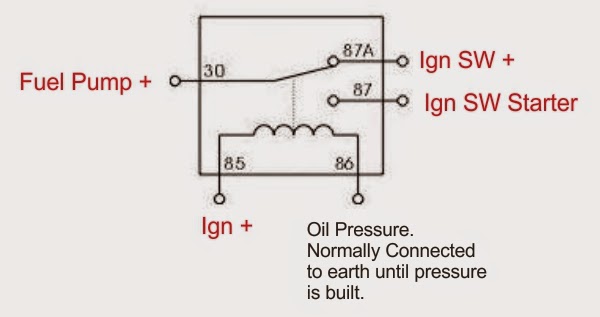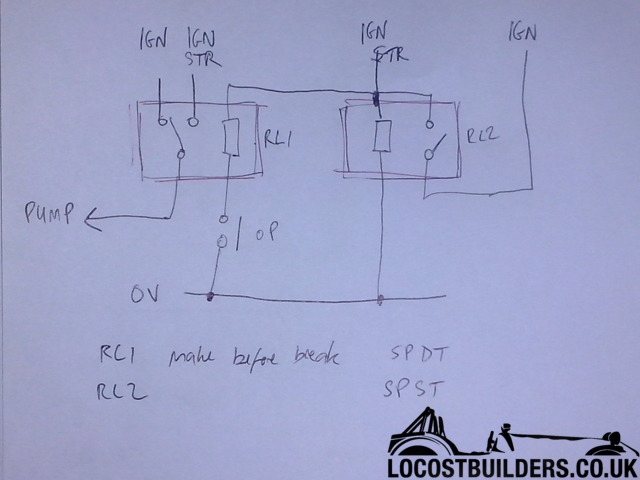
Facet pump safety switch
JeffHs - 10/6/15 at 04:04 PM
Does anyone know a source for a 3 terminal oil pressure safety switch? I'm fitting a Facet pump and it recommends such a switch which seems to be
common in the US but I can't find one here.
I guess I could wire the pump's earth to a normal single terminal switch as used on UK vehicles, with a manual over-ride for priming.
Any suggestions?
rusty nuts - 10/6/15 at 04:13 PM
I've used an easily available inertia switch , loads of them in breakers
JeffHs - 10/6/15 at 04:33 PM
Found one at Demon Tweeks - expensive though. Can be found for $10 in US
http://www.demon-tweeks.co.uk/Product.do?method=view&n=1282&p=16365&c=215&utm_source=Google&utm_medium=Base&utm_campaign=Switc
hes&gclid=CjwKEAjwwN-rBRD-oMzT6aO_wGwSJABwEIkJQGBQpJ38eVaB01-9sw_ljvT3oDxqQetdJ64dzdc54hoCyAbw_wcB
02GF74 - 10/6/15 at 07:02 PM
Either oil pressure switch or alternator charging lamp are usuak candidates, a button for @override at start upis required or a feed of starter motor
solenoididoyd.
Stot - 11/6/15 at 04:08 PM
here is a diagram showing the way I ran the fuel pump on my old carbed crossflow car.

Turning on the ignition would energize the coil meaning that to get power to the fuel pump you had to be cranking the engine. Once the engine starts
the oil pressure has built and the coil de-energises supplying power to the fuel pump from IGN live. If the engine stalls or you lose oil pressure for
some reason the coil energizes and the fuel pump will stop again until you crank it again.
No need for prime button here either.
Cheers
Stot
[Edited on 11/6/15 by Stot]
JeffHs - 11/6/15 at 06:54 PM
Thanks guys. I do need a prime button because my car is used so infrequently that I run out of battery before the car starts. It needs a lot of
cranking to prime the system, so an electric pump would be ideal.
Stot, your diagram looks interesting buy try as I might I can't understand it. As drawn it looks like the pump is always live when ignition is on
so I don't see it matching your description. I'm obviously missing a trick there
Stot - 11/6/15 at 07:35 PM
The oil pressure light on my car (xflow) was connected to ground when there is no oil pressure so that the dash warning light, lights. When oil
pressure is applied it disconnects from ground and so the light goes out. We piggyback this to power, or de-power the coil.
Turning on the ignition would energize the coil as its getting ignition live and is grounded by the oil pressure switch - Pins 30 and 87 are connected
- Not cranking the engine so no power to the Fuel pump.
As you crank the engine you are feeding pin 87 from the starter solenoid. Fuel pump gets power from starter.
Once the engine starts the oil pressure has built and the coil is now no longer getting a ground signal from the oil pressure switch so the coil
de-energizes - Pins 30 and 87A are connected - Fuel pump gets power from Ignition live on 87A.
If the engine stalls or you lose oil pressure for some reason the coil is grounded through the oil pressure switch again and the coil energizes - Pins
30 and 87 are connected again but as you are not cranking the engine you are not getting power from the starter solenoid so fuel pump gets no power
and stops.
It does/did work out  .
.
Cheers
Stot
britishtrident - 12/6/15 at 07:35 AM
Some 1990s Rover and Land-Rover models use a switch the is NO, on the oil pressure rising it makes contact.
JeffHs - 12/6/15 at 08:16 AM
Thanks for all the suggestions. I had concluded that a NO switch was the simplest option, so just need to find one with the right thread (1/8 NPT to
match my T piece and keep the existing oil pressure gauge tapping)
02GF74 - 12/6/15 at 05:26 PM
Diagram is good and works as descibed.
But sounds like OP wants to power fuel pump without cranking the engine as it drains battery and the circuit wont do that.
Let me think about, sure it can be done.
Ok, i think this may do it.

Rl2 is latched once ign switch has gone to starter pos.
With engine running, if oil pressure goes, rl1 will stop engine by connecting to ign starter, which will not be powered
Ign has to be turned off to unlatch rl2 so that engine fuel pump can be powered when in ign postion, pump will be powered when in ign starter but it
wont have been primed.
Someone check this to be sure it is correct.
[Edited on 12/6/15 by 02GF74]


 .
. 